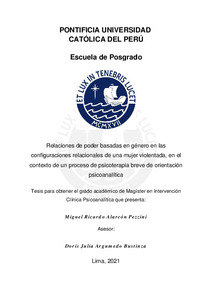| dc.contributor.advisor | Argumedo Bustinza, Doris Julia | |
| dc.contributor.author | Alarcón Pezzini, Miguel Ricardo | |
| dc.date.accessioned | 2022-06-14T22:46:18Z | |
| dc.date.available | 2022-06-14T22:46:18Z | |
| dc.date.created | 2021 | |
| dc.date.issued | 2022-06-14 | |
| dc.identifier.uri | http://hdl.handle.net/20.500.12404/22593 | |
| dc.description.abstract | El estudio tiene el propósito de comprender las relaciones de poder basadas en género de
una mujer violentada, en un proceso de psicoterapia breve de orientación psicoanalítica.
Para conseguirlo, se realizó un análisis temático de los contenidos emergentes de las
relaciones de poder con los otros significativos y con el terapeuta, organizando estas
categorías a partir de la estructura de las configuraciones relacionales. Se encontraron tres
configuraciones relacionales, las cuales se desplegaron repitiendo patrones de poder
asimétricos basados en género, tanto con los vínculos significativos, como en el vínculo
terapéutico. En cuanto a la primera configuración, se mostró una representación del self
vulnerable y una representación del otro como alguien potencialmente peligroso;
articulándose ambas representaciones alrededor de un deseo de cercanía y confianza. Se
encontró que ante la respuesta de cercanía del otro, el self responde con miedo y
desconfianza, no pudiendo recibir las cosas buenas que le ofrecen. La segunda
configuración se basó en la representación de un self que falla, mientras que la
representación del otro se caracterizó por ser la de alguien capaz de legitimar. Estas
representaciones se articularon alrededor de un deseo de reconocimiento. Los hallazgos
dieron cuenta de que el otro responde juzgando y violentando, ante lo cual el self responde
de dos maneras posibles, sea también violentando y descalificando, o sintiéndose culpable
por fallar. Con respecto a la tercera configuración, se dio cuenta de la representación de
un self frágil y la representación de un otro fuerte y agente de sí mismo. En ambas
representaciones estuvo en juego un deseo de contención emocional. Los resultados
mostraron que es mediante la respuesta de apoyo y contención del otro, que el self
responde sintiéndose sostenido. | es_ES |
| dc.description.abstract | The research proposes to study the gendered power relations of a battered woman in a brief
psychoanalytic psychotherapy. To get it, a thematic analysis of the emerging contents was
made to describe the power relations with the significant others and the therapist. The
resultant categories were organized based on the structure of the relational configurations.
Three relational configurations were founded, each of them displaying and repeating
asymmetric gendered power patterns with the significant others and the therapeutic
relationship. Regarding the first configuration, a representation of the self as vulnerable and
a representation of the other as someone potentially dangerous were shown; articulating
both representations around a desire for closeness and trust. It was found that before the
response of closeness of the other, the self responds with fear and distrust, not being able to
receive the good things that are offered to him. The second configuration was based around
a self-representation as someone who fails and an other-representation as someone capable
to legitimize, both linked by a desire of recognition. The findings showed that the other
responds by judging and expressing his violence, to which the self responds in two possible
ways, also expressing his violence and disqualifying, or by feeling guilty for failing. The
third configuration was based on a self-representation as fragile and an other-representation
as someone strong and with agency. Both representations were linked by a desire of
emotional containment. The results showed that it is through the response of support and
containment of the other, that the self responds feeling sustained. | es_ES |
| dc.language.iso | spa | es_ES |
| dc.publisher | Pontificia Universidad Católica del Perú | es_ES |
| dc.rights | info:eu-repo/semantics/closedAccess | es_ES |
| dc.subject | Poder | es_ES |
| dc.subject | Género | es_ES |
| dc.subject | Violencia contra la mujer | es_ES |
| dc.subject | Psicoterapia | es_ES |
| dc.title | Relaciones de poder basadas en género en las configuraciones relacionales de una mujer violentada, en el contexto de un proceso de psicoterapia breve de orientación psicoanalítica | es_ES |
| dc.type | info:eu-repo/semantics/masterThesis | es_ES |
| thesis.degree.name | Maestro en Intervención Clínica Psicoanalítica | es_ES |
| thesis.degree.level | Maestría | es_ES |
| thesis.degree.grantor | Pontificia Universidad Católica del Perú. Escuela de Posgrado. | es_ES |
| thesis.degree.discipline | Intervención Clínica Psicoanalítica | es_ES |
| renati.advisor.dni | 08274983 | |
| renati.advisor.orcid | https://orcid.org/0000-0003-4555-2194 | es_ES |
| renati.author.dni | 45715565 | |
| renati.discipline | 313127 | es_ES |
| renati.juror | Aguirre Egocheaga, Marite Alexandra | es_ES |
| renati.juror | Argumedo Bustinza, Doris Julia | es_ES |
| renati.juror | Paredes Galleno, Alinda Giannina | es_ES |
| renati.level | https://purl.org/pe-repo/renati/level#maestro | es_ES |
| renati.type | https://purl.org/pe-repo/renati/type#tesis | es_ES |
| dc.publisher.country | PE | es_ES |
| dc.subject.ocde | https://purl.org/pe-repo/ocde/ford#5.01.00 | es_ES |





